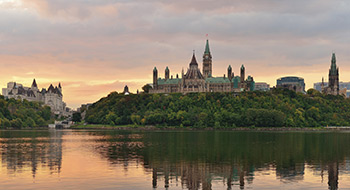

On election night 2006, Stephen Harper walked out in front of a room full of supporters and smiled at the country that had just voted for change.
The incoming prime minister at that time told the crowd that the party would clean up Ottawa with the Accountability Act. They would cut the GST to 5%. And the Conservatives would scrap the Liberal childcare program and give money directly to parents.
Read: Should saving for your kids’ education trump saving for retirement?
He spoke of the big picture, saying the Canadian identity was not forged by government policy, nor did it flow from any one party or leader. “The result tonight signals a change of government, not a change of country,” Harper had said in his victory speech.
Yet after nine years in office, much has changed. The federal government, in particular, has shrunk. Taxes, such as the GST, have gone down and the tax code is sprinkled with tax credits.
The federal government has become less active in the daily lives of Canadians, with direct benefits replacing big government programs, for instance.
On the benefit front, the Conservative approach has become convention. Today’s Liberals promised a new child benefit of their own to replace the existing universal program. And the other parties have started to understand how to target pocketbook issues during elections that Harper used so effectively, and that voters are now acutely aware of.
Read: Canadians confused about TFSAs
There is also one clear change that Harper has left on the political map: a unified Conservative party with a track record that spans a decade.
Observers say his efforts have inched federal politics to the right — although not as radically as some think, says Richard Nimijean, who teaches Canadian studies at Carleton University in Ottawa. Harper, he notes, continued a path of slashing federal spending and tax cuts that started in the 1990s under the Liberal government of Jean Chretien.
The provinces have become bigger spenders, with provinces like Ontario still running deficits as the tax burden has shifted.
Moving the federal government back into a more activist role won’t be easy because the money to pay for new programs has to come from somewhere, says David McGrane, an associate professor of political studies at the University of Saskatchewan.
Read: Voluntary CPP expansion wouldn’t change the way Canadians save
Cutting the GST by two points eliminated about $14 billion in annual government revenues. No government will want to increase the GST to pad the bottom line, McGrane says. “That’s the largest thing that Stephen Harper has changed in Canada: just shrinking the size of government and doing so by reducing the tax base.”
